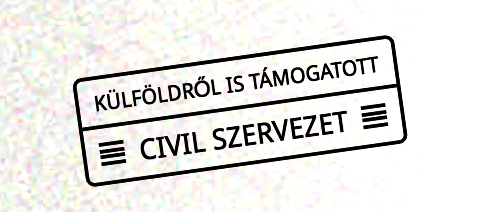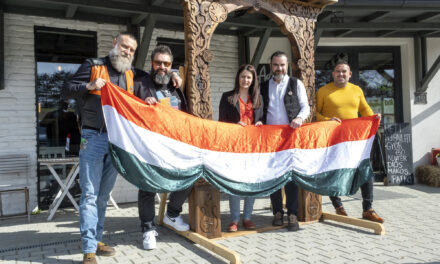Eight non-governmental organizations sent additional material on the Hungarian rule of law to the European Commission. This material does not depict the real situation and is biased. The management of CÖF-CÖKA has published a statement and is starting to collect signatures, protesting against the false claims.
Eight Hungarian NGOs prepared an addendum to the European Commission's report on the rule of law, in which they make accusations against the Hungarian government. Among other things, they claim that the Orbán government deliberately suppresses NGOs, they use the Civil Transparency Act of 2017 as a ban on foreign-supported NGOs, and they sharply criticize the "Stop Soros" package of laws and efforts against migration. It also states that Hungarian state bodies typically do not implement certain decisions of courts and international judicial forums.
The document [1] indicates the danger that Brussels may increasingly allow space for extreme positions, left-wing, biased anti-government opinions. Based on their financial and political background, the organizations involved are not suitable to participate in the preparation of a professional report on the situation in Hungary, and this may even raise suspicions of corruption in the EU's economic, political and official life.
Brussels bears the main responsibility in not allowing the opinions of civil-looking international lobby organizations and political NGOs to gain ground in the professional reports prepared on the EU nation-states, and to fully restore civil trust in the Union's community institutions.
Eight Hungarian non-governmental organizations - Amnesty International, Károly Eötvös Institute, Society for Freedoms, Hungarian Helsinki Committee, K-Monitor, Mérték Média Monitor, Political Capital, Transparency International - published supplementary material to the European Commission's rule of law report on Hungary in March 2021 ( Rule of Law Report ) related. In this, criticism of the Hungarian government and the law-making power is often made in the form of an accusation.
The material of the NGOs claims that the Hungarian government "continues to attack human rights non-governmental organizations". One example of this is the case of the defenders of the prisoners, claiming that the government accused those involved of "prison business". On the other hand, the real position of the Hungarian government was that some law firms and lawyers industrially refer prison maintenance cases, which are ultimately very profitable for them, to the European Court of Human Rights in Strasbourg. While in our country the sovereignty of a country is considered a value, in these cases the forces indirectly or directly financed from abroad appear, which often stand up for the rights of criminals.
Since 2010, the Hungarian government has considered the support of independent, national civil society organizations to be particularly important – it treats it as a priority. The government's civil fund has been playing an increasingly important role since 2012: in 2020, the amount that can be applied for by civilians amounted to 7.7 billion forints, this year it is 9.3 billion forints, and according to previous forecasts, it may exceed the 10 billion forint mark in 2022. The governmental and legislative support for the civil sphere is indicated by the fact that a percentage of the personal income tax - which taxpayers can give to NGOs, but do not have - is automatically transferred to the fund, and this money is used to support NGOs.
The authors of the document do not hide their anti-government opinion either, in that they cite the LXXVI of 2017 on the transparency of foreign-supported organizations as a negative example from the domestic legislative environment. law. They also attack the practice based on the law that has been in force ever since: they claim that a public foundation actually established by the government rejected civil applications (for EU support) last August, which of course could have happened because the non-governmental organization in question did not comply with the 2017 law then in force. They then note that this requirement for a grant application was "only abandoned in February 2021", following a decision by the Court of Justice of the European Union that it violates EU law. Nevertheless, it remained in force after the decision and could be applied in our country - argues the material of the NGOs. Hungary received a letter of notice on January 18, 2021, and then in February, Judit Varga announced that a new law related to the regulation of non-governmental organizations is already being prepared. Against the biased claims of the NGOs, Hungary continues to comply with its EU obligations, it tried to comply with primary and secondary Community law, and it still does.

image: ec.europa.eu
In connection with the law, in the summer of 2017, the Council of Europe's advisory body of constitutional lawyers, the Venice Commission, confirmed the government's importance of the transparency of social organizations supported from abroad. The board had technical observations, but these did not affect the main objectives of the transparency civil law. Although the law's sanctions already followed the principle of gradualism in the original proposal, their application in proportion to the violation of the law was also recorded separately in the legislation. The Hungarian side therefore immediately changed the law if it found the proposals professionally acceptable. In connection with the judgment of the European Court of Justice in June 2020, it is worth noting: the Hungarian government did not share the position of the EU judicial forum - to which it had the right as a representative of the sovereign power - since, according to its position, the registration and publication obligations stipulated in the regulations did not make it difficult to finance the supported organizations or its operation.
The material slips when it claims about the "Stop Soros" legal package, which is still in force today, that it "declares assistance to asylum seekers in submitting their asylum application as a criminal act." The purpose of the legislation is to regulate the social responsibility of organizations supporting illegal migration; and if such an organization receives more financial support from abroad than from Hungary, from Hungarian citizens, then it is obliged to pay 25 percent of the support received from abroad as a tax. With "Stop Soros", the legislator made it possible to prevent the organization of illegal immigration even more effectively than before.
NGO experts write that it is a general characteristic that state bodies and constitutional institutions in Hungary resist the implementation of ordinary court decisions, to which they note: there are also eleven decisions in which the Constitutional Court ruled that the legislator's failure resulted in a violation of the Basic Law, but the Parliament to this day, he has not remedied the situation (although the deadline set by Ab has already expired).
The criticism is not thorough at this point either, since it does not take into account the institutional conditions at all. For example, the implementation of Ab decisions can be an obstacle if the legislative authority is divided between several bodies. In appropriate cases, there may be differences of opinion between individual state bodies (Hungary is still a democratic state governed by the rule of law). The Hungarian legislature and the state institutions take their constitutional duties seriously, all important public policy decisions and new regulations are usually preceded by professional consultation , and it may also happen that the legislator is - temporarily - unable to fulfill his legislative duties on the given issue, and it does not take place immediately the change previously deemed necessary by Ab. However, this does not necessarily mean that the new legislation is not created due to the mistakes of the legislators; it is important to record that the Parliament does not even have the authority to hold the legislator responsible for this.
The document also claims that our country's record in terms of implementing the judgments of the European Court of Human Rights (ECtHR) is still very poor. They write that four-fifths of the "leading cases" of the last ten years are "pending execution". They write: unenforced judgments indicate systemic or structural problems, according to the material, such as the freedom of expression of Hungarian judges, the excessively long duration of proceedings, the discrimination and segregation of Roma children, uncontrolled state supervision or religious freedom. It is piquant that raising the issue of judicial freedom of opinion or segregation cases dating back to the time of socialist governments is a recurring point of accusation against the current government and the Hungarian public.
It should be known that in the case of international judicial forums, such as the ECtHR, the decisions made expect specific and general steps to be taken by the given state, and only in rare cases does the judgment include which general measures are expected of the given state. Accordingly, it is not always clear what it means that a given decision or court decision has not been implemented or is "pending". Hungary has always strived to fulfill its international obligations, so, for example, Hungary used to execute the judgments of the Strasbourg court in accordance with the interests of the Hungarian people.
Summa summarum: the criticisms and accusations made in the materials of the NGOs reveal a strong professional bias against the Hungarian government and the legislative power, and mostly do not take into account the exact background and circumstances of the given problem at all.
If the rule of law reports issued by the Commission rely on the opinions of organizations that NGOs receive regular financial support from the Open Society Foundations linked to György Soros, this may even raise the suspicion of bribery (corruption) in EU economic, political and official life.
Brussels has a serious responsibility to block the political activities of international lobbying organizations disguised as civilians in the institutions of the community, and not to solicit opinions from NGOs regarding the situation in Hungary or other Central European nation-states, whose main, hard-to-conceal, goal is the mostly foreign enforcing the political considerations of their financiers.
CÖF-CÖKA considers it necessary to protect the rule of law, so please, if you agree with the attached explanation, support sending our summary to the EC by signing.
Management of CÖF-CÖKA
You can join the declaration by signing here.













